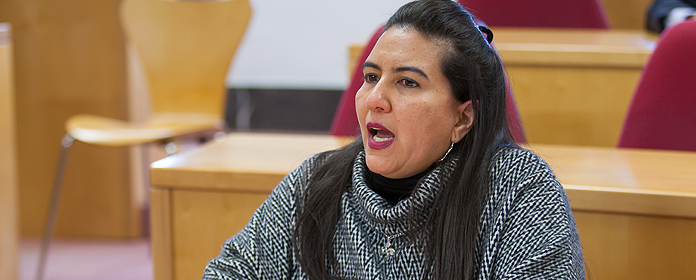"There is still a long way to go in the recognition of the rights of people with manifest functional disabilities."
Nadia Domínguez, who defended her thesis at School Law, analyzes the status in the political arena of people with DFM.

The Central Electoral board included in the instruction of March 11 the extension of the right to suffrage to persons with disabilities, but it did so with a nuance that caused a discussion around this topic, since it included the precision: "In the event that any member of an Electoral Table, or some of the interveners or proxies assigned to that Table considers that the vote of a person with disabilities is not exercised consciously, freely and voluntarily, he/she may record it in the certificate of the session, but said vote will not be prevented from being introduced in the ballot box". A few days later, the note "person with disability" was eliminated, extending this criterion to all citizens.
Nadia Domínguez, who defended (DEC '18) her thesis 'Las personas con diversidad funcional manifiesta en el ámbito político. Especial reference letter a la status de las mujeres' in the School of Law of the University of Navarra, analyzes the status in the political sphere of people with manifest functional diversity (DFM).
Do people with DFM suffer discrimination in the political arena?
Taking into consideration that Spain, as a signatory country of the Convention on the Rights of Persons with Manifest Functional Diversity, recognizes this population group the right established in article 29, it cannot be ignored that despite this, until very recently in the Spain of the XXI Century, a large issue of citizens (approximately 100,000) were "forbidden" their right to vote, both active and passive (i.e. to elect people who would represent them in the political sphere and to be able to stand as candidates) as a result of court rulings modifying their right to vote.000), were "forbidden" their right to active and passive suffrage (i.e., to elect the persons who would represent them in the political sphere and be able to run for office) as a consequence of court rulings modifying their capacity to act, which led to their elimination from the Electoral Roll. The above is a clear sample violation of the Convention and one of the many rights that have been violated to these people, which leads us to point out that it is a way of discriminating against them in the political sphere.
How can respect for the rights of people with DFM be facilitated in the political arena?
Taking into account the previous question, one of the ways is to guarantee accessibility in the polling stations. In this sense, it is also important to guarantee material accessibility: that the material is in Braille, in easy reading, in pictographic language...
Do you think there is still some way to go in terms of awareness and recognition of their rights?
There is still a long way to go in terms of awareness and recognition of the rights of people with DFM. It is necessary to work hard for the respect of the Human Rights of this social group . The bet should be aimed at building a counter-discourse from the broad view of "normality".
In his thesis , 'People with manifest functional diversity in the political arena. Especial reference letter a la status de las mujeres', made a specific allusion to the status of women. What is your status in the political arena?
In order to rescue from silence the status of women with DFM, it is worth noting that while feminism denounces the existence of a "glass ceiling" that systematically excludes women without DFM from relevant political positions in any institution, such as managers or political leaders, such status has not even been raised for women with DFM, since most of them live in "sticky floor" positions; that is, in low-wage situations, reduced to the domestic sphere and unemployed.
What were the conclusions derived from your research?
Some of them are aimed at making visible that, regarding the political participation of this sector of the population, the rights on which the norms have had most impact have been those related to accessibility(electoral facilities-materials) and active suffrage. There is no emphasis on passive suffrage; which led to the conclusion that measures are required for this purpose. On the other hand, that there is sufficient literature on women-participation and political representation; also on women with DFM. But there are no publications related to political participation and representation of these women. Most of the programs of study have been carried out in the fields of poverty, dependency or health.
What are the difficulties that people with DFM encounter when developing professionally in politics and public management ?
Based on my feminist interest, I dare to affirm that the difficulties encountered by women with DFM when it comes to developing professionally in politics and public management are due to the fact that prejudices, stereotypes and the image that the rest of society attributes to them leads them to find themselves in a "double disadvantage" status , which affects them in the development of their autonomy staff and causes many of them to be isolated from the social sphere.
Are governments implementing real inclusive measures for people with functional diversity?
Important steps have been taken at topic towards the integration and inclusion of people with DFM, especially in aspects concerning health, Education and labor, and progress has been made in their political participation. However, it should be emphasized that there is no binding legal instrument aimed at achieving the incorporation of people with MCI in general, and women in particular, in terms of political representation.




